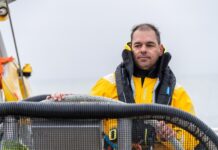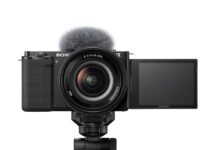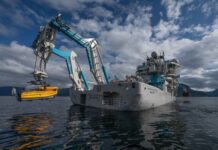In a breakthrough advancement for sustainable maritime transport, Swedish tech company Candela Technology AB announced today that the Candela P-12, the world’s first electric hydrofoiling passenger vessel, has successfully completed test flights in Stockholm. It is now progressing into serial production at Candela’s Rotebro factory.
First announced in concept form in June 2022, the P-12 employs computer-guided hydrofoils to elevate its hull above water friction. When foilborne at speeds over 18 knots, the Candela P-12 consumes 80% less energy than traditional high-speed vessels. This innovation addresses the primary challenges that have hindered the widespread adoption of electric, fast vessels to date: limited range and slow speeds due to the excessive energy consumption of conventional hulls.
During its first flights, Candela P-12 confirmed its top speed of 30 knots, a record for electric passenger vessels. With a range of up to 50 nautical miles, it is also the first electric ship with the practical endurance to cover most coastal transport needs.
Tests also confirmed the minimal wake, which opens up for exemptions from speed limits, as the P-12 will neither erode coastlines nor damage docks and moored ships, even at full speed.
Going Sustainable, Profitably
Maritime transport represents 3% of global CO2 emissions, a figure projected to grow to 13% in the coming decades if no action is taken. High hopes are therefore placed on electric vessels, with the market for electric ships estimated to hit US$ 31.48 billion by 3034.
Still, electric vessel adoption today is extremely low, even on urban and coastal waterways, due to their high cost and limited performance.
Candela is committed to accelerating the shift towards a fossil fuel-free maritime future. Besides its game-changing range and speed, the P-12 is engineered to offer similar or lower initial investment costs for operators while boosting profits compared to traditional Internal Combustion Engine (ICE) vessels.
Priced at €1.7 million, the 30-seat Shuttle variant of the P-12 matches the cost of similar-sized ICE vessels and is priced significantly lower than other electric options. This is possible thanks to its hydrofoil efficiency, which enables an extended range from a modest 252 kWh battery. Combined with a streamlined serial production, this leads to industry-low overall unit costs.
Erik Eklund, Candela’s Director for Commercial Vessels, emphasizes, “With the P-12, we’re not just offering a faster, more comfortable electric alternative to fossil fuel-powered vessels. We enable operators to make the switch to sustainable vessels that are cost-effective and profitable, a crucial step towards clean oceans and lakes.”
Once in service, operators can expect reduced ‘fuel’ costs by up to 90% compared to diesel vessels. The C-POD motors require minimal servicing, and the vessel is designed for single crew operation, which further slashes costs.
In total, the P-12 is expected to cut costs per passenger kilometer by up to 50%, achieving a similar operational per-passenger economy as a hybrid electric bus.
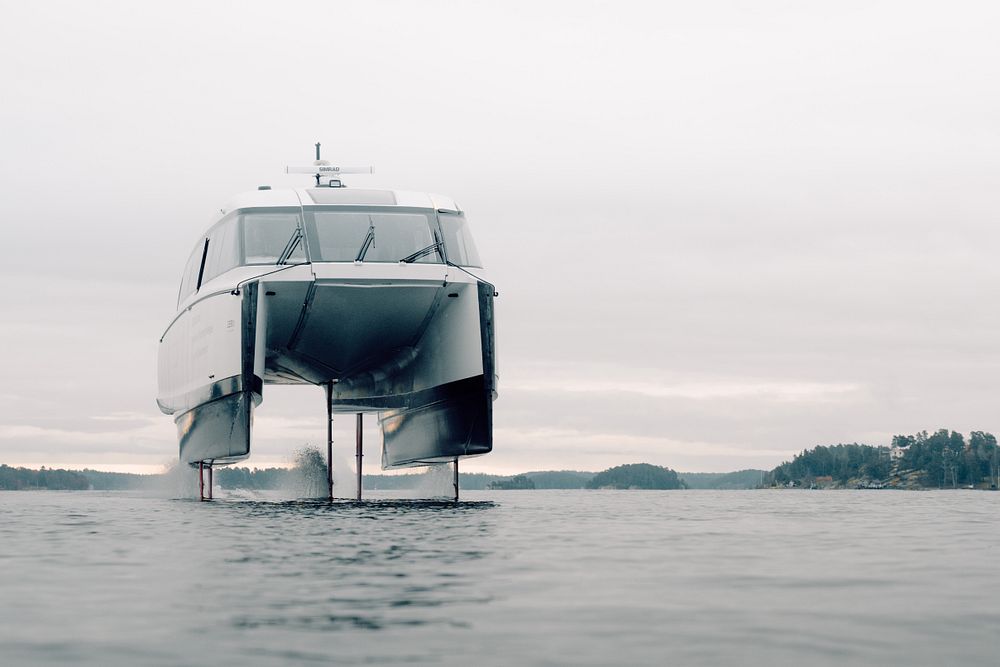
A Better Passenger Experience
Candela’s pursuit of innovation extends beyond the hydrofoil system. The tech company’s engineers have reimagined every element of vessel design, from maintenance to docking, to provide a superior experience.
Passengers enjoy swift and easy boarding via an extendable, automatic bow ramp, adjustable for docking at varying quay heights from 0.3 to 1.8 meters. This versatility enables the P-12 to serve a multitude of routes globally without the need for dock alterations.
Each stop’s turnaround time is under 2 minutes, courtesy of the C-POD motors’ thrust vectoring for nimble maneuvering—even allowing the vessel to move sideways when required.
Once flying, the digital flight control system compensates for waves, side wind, and current by adjusting the hydrofoils’ angle of attack 100 times per second, providing a smooth ride free from sea sickness-inducing pitching and slamming. This system, reminiscent of technology found in modern jet fighters, has been developed by Candela’s engineers since 2016 and fine-tuned in the company’s leisure vessels, the C-7 and C-8.
Three Versions
The P-12 is a versatile platform designed to accommodate an array of use cases and clients, from public transport to bespoke private shuttles.
It is available in three variants: the P-12 Shuttle, P-12 Business, and P-12 Voyager.
The Shuttle configuration seats 30 passengers and sets the benchmark for sustainable commuting with the lowest operational costs in the industry. Allocated space for bicycles (along with strollers and wheelchairs) encourages the integration of cycling with public transport.
The Business version features a premium interior with seating for 12 to 20 passengers (and plenty of suitcases), and the highly adaptable Voyager version offers customers flexibility in interior design, catering to both private leisure and commercial clients.
“The P-12 is a platform that will cater to a vast range of clients. Whether it’s public transport fleets, VIP services, or private customers, it will revolutionize how we travel on water,” says Gustav Hasselskog.
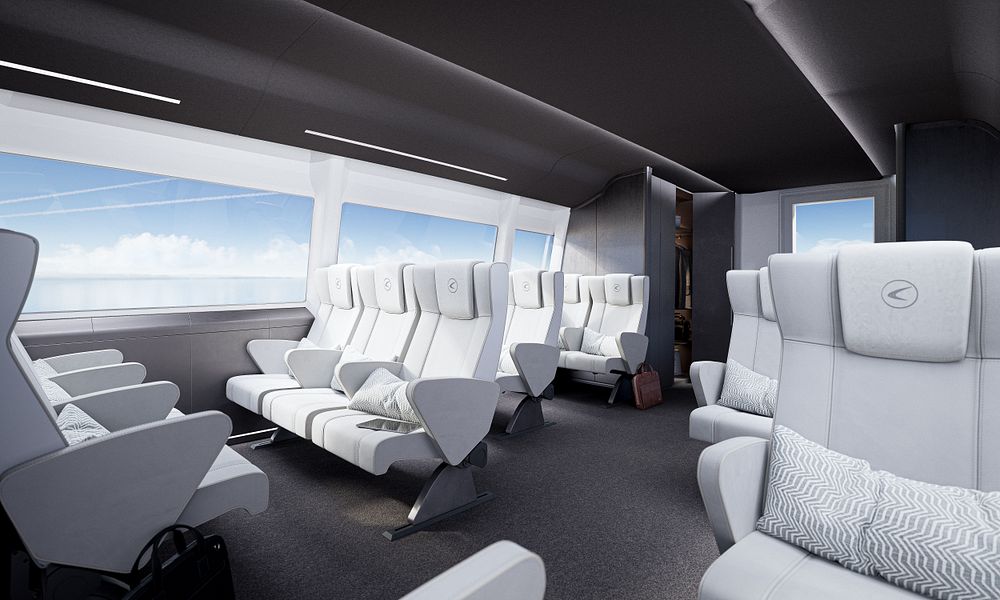
Halving Commute Times in Stockholm
In a pilot, the Candela P-12 Shuttle is set to join Stockholm’s public transport network in 2024, reducing the Ekerö suburb-city center commute from 55 to 25 minutes, surpassing cars, buses, and current diesel ferries in speed. This is possible by obtaining an exemption from the city center’s speed limits, thanks to the vessel’s minimal wake.
In Stockholm, as in many waterfront cities, waterborne traffic has been dwindling as buses and cars provide quicker and more affordable transport. The P-12 aims to reverse this trend.
“Today, in many cities, congested roads are common while waterways — humanity’s oldest transport infrastructure — remain underutilized for rapid commuting. The P-12 will let you use these waterways as green highways, enabling fast intra-city connections. Often, the quickest route is by water,” states Gustav Hasselskog.
Candela P-12 Specs
Length: 11.99 meters
Beam: 4.5 meters
Payload: up to 30 passengers
Battery: 252 kWh
Motors: 2 x Candela C-POD MAX, 340 kW total peak power
Charging: 175 kW DC charging, overnight AC charging
Top Speed: 30 knots
Service Speed: 25 knots
Range: 40 to 50 nautical miles at 25 knots depending on version and load
Price €1.7M for Shuttle configuration
Article Provided









